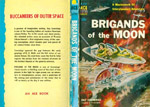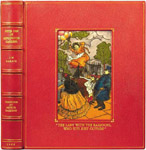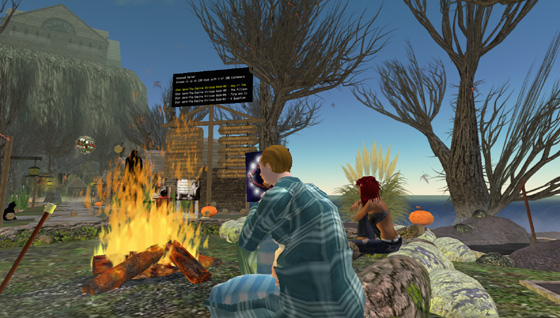
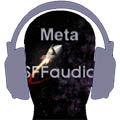 I live and breathe Science Fiction, but like many, I have some trouble defining what that term actually means. Sometimes I use Damon Knight’s definition for it… “Science Fiction is what I point to when I say it.” Sometimes I classify a story as a Fantasy even though it appears to be SF (think Star Wars), often this is because of its flagrant disregard for science. But Fantasy isn’t just the wastebasket under Science Fiction – far from it. I see Fantasy as a branch of SF (though I know other people see SF as a branch of Fantasy). If you visit the site often you also may notice I tend to capitalize the “S” and the “F” – it is even in our website logo – I insisted on that point. We had some debate, Scott and I, about whether the site should just be called SFaudio.com, I argued for the extra F, to represent Fantasy. Poor old Horror, always the ugly sister, was left out of the site name entirely. Sometimes therefore I use the “SF” abbreviation, the logic being, “SF,” other than it being shorter, can also stand for “Speculative Fiction” – which includes Horror (and Fantasy too).
I live and breathe Science Fiction, but like many, I have some trouble defining what that term actually means. Sometimes I use Damon Knight’s definition for it… “Science Fiction is what I point to when I say it.” Sometimes I classify a story as a Fantasy even though it appears to be SF (think Star Wars), often this is because of its flagrant disregard for science. But Fantasy isn’t just the wastebasket under Science Fiction – far from it. I see Fantasy as a branch of SF (though I know other people see SF as a branch of Fantasy). If you visit the site often you also may notice I tend to capitalize the “S” and the “F” – it is even in our website logo – I insisted on that point. We had some debate, Scott and I, about whether the site should just be called SFaudio.com, I argued for the extra F, to represent Fantasy. Poor old Horror, always the ugly sister, was left out of the site name entirely. Sometimes therefore I use the “SF” abbreviation, the logic being, “SF,” other than it being shorter, can also stand for “Speculative Fiction” – which includes Horror (and Fantasy too).
Now, before you say, “Jesse, WTF are you capitalizing all these abstract nouns?” I’ll explain that too… I capitalize the Science Fiction the way many folks capitalize the “H” in “Him” when referring to God. And other than this one I don’t think you’ll find a single post in which I’ve personally abbreviated Science Fiction as “sci-fi.” On that issue, I’m with Harlan Ellison:
“…the hideous neologism ‘sci-fi’–which sounds like crickets fucking–is at the core of this seeming malaise. What is called ‘sci-fi’ is _not_, repeat NOT, science fiction. It is special effects movie/television produced by and for imbeciles. Giant lizards, moronic space battles with spaceships acting as if they were Spads and Fokkers dogfighting in atmosphere, recycled fairy tales, and illiterate appeals to paranoia. They bear as much relation to science fiction of quality (whether film or tv or books or magazines) as Dachau did to a health spa.”
Gotta love Harlan, he doesn’t mince words – he sautés them. But back to the matter at hand… the funny thing, despite my attempt at inclusivity I’ve got standards when it comes to what qualifies as what. SF is what I say it is, but I can’t just point to anything. So, for instance, we don’t talk about mainstream literature here. It isn’t that a lot of it isn’t good – as that’s also true about SF, Fantasy and Horror. The reason mainstream literature doesn’t get the mentioned here is that mostly, even when it is well written, a lot of it still really, really sucks. I mean that quite literally. It sucks. It sucks your time, it sucks your money and it doesn’t give you anything to show for it. Sure you’ve got a kind of satisfaction, some internal catharsis perhaps, but it doesn’t give you anything to challenge your beliefs. This month’s Oprah bestseller is little better than next month’s paperweight, except that a paperweight made of paper is already rather redundant. There’s a reason you’ll find some of these books in the supermarket check-out isle, it is because they are, like candy, something you pick up quite casually. And the fiction I read, and the fiction we tell you about, better not be that god-damned casual!
This all came to mind as I was listening to a non-SF podcast recently…
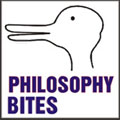 Philosophy Bites, is a podcast that interviews “top philosophers” in “bite-sized” segments. The hosts are: David Edmonds, a philosopher and writer whose day job is making radio documentaries for the BBC, and Nigel Warburton, another philosopher/writer who teaches and blogs about philosophy. They take their podcasts seriously. A recent guest, Alain de Botton, famous for his decidedly not SF, bestselling book The Consolations Of Philosophy brought up this very topic, turning the everyday experience (for our purposes, mainstream fiction) into matters of deep philosophy |MP3| subscribe to the podcast via this feed:
Philosophy Bites, is a podcast that interviews “top philosophers” in “bite-sized” segments. The hosts are: David Edmonds, a philosopher and writer whose day job is making radio documentaries for the BBC, and Nigel Warburton, another philosopher/writer who teaches and blogs about philosophy. They take their podcasts seriously. A recent guest, Alain de Botton, famous for his decidedly not SF, bestselling book The Consolations Of Philosophy brought up this very topic, turning the everyday experience (for our purposes, mainstream fiction) into matters of deep philosophy |MP3| subscribe to the podcast via this feed:
http://www.philosophybites.libsyn.com/rss
One alternative to mainstream literature about everyday experience is mainstream historical fiction. Sometimes I read or listen to a historical fiction novel (or should that be Historical Fiction) that I want to talk about on SFFaudio, but can’t because it doesn’t tie into SF, F or H. In cases of extreme delight though I can usually somehow stretch the boundaries of what I normally would consider proper SF to suit my purposes. A post about Crazy Dog Audio Theatre’s Infidel, which is based on true history, for instance, was saved by calling it Horror. The reasoning being that the Horror genre, includes the idea of “moral horror”, horror that comes not from fear for one’s bodily integrity, but fear for one’s beliefs, fear one’s values – the kind of fear you get when you watch true Film Noir, like Chinatown say.
I deem these kinds of tales eminently philosophical. Which ties back into Science Fiction, as SF is, when you get up close and personal to it quite actually Philosophical Fiction.
But then again, one really ought to just has to stick to one’s guns and exclude a lot of stuff too. Stuff like the Hardcore History podcast….
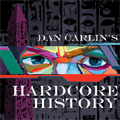 The Hardcore History podcast, produced by Dan Carlin and his increasingly unlikely parter “Ben,” performs auditory miracles of storytelling using absolutely no fiction, or science at all. This is a pure History fan-boy show. There is no reasonable way that a blog about Science Fiction and Fantasy audio can mention this stunningly wonderful bi-monthly (or so) podcast with a straight face. At least not if it wants to pretend to be strictly topical blog. Subscribe via this feed:
The Hardcore History podcast, produced by Dan Carlin and his increasingly unlikely parter “Ben,” performs auditory miracles of storytelling using absolutely no fiction, or science at all. This is a pure History fan-boy show. There is no reasonable way that a blog about Science Fiction and Fantasy audio can mention this stunningly wonderful bi-monthly (or so) podcast with a straight face. At least not if it wants to pretend to be strictly topical blog. Subscribe via this feed:
http://www.dancarlin.com/dchh.xml
The only way one could post about Hardcore History and even pretend, with any honesty preserved, to be on-topic would be to compare it to an even less related program…
 Entitled Opinions (which has just started it’s much anticipated fourth season) is a podcast radio program hosted by Professor Robert Harrison. Harrison teaches in the department of French and Italian and likely has never even read a Science Fiction novel in his life. Therefore I won’t ever mention his podcast here, except for one thing, EQ is a literary talk show that I like. Harrison interviews guests about issues that range from literature and philosophy to politics and sports. I have a feeling that one day, given infinite time, he might talk about SF.
Entitled Opinions (which has just started it’s much anticipated fourth season) is a podcast radio program hosted by Professor Robert Harrison. Harrison teaches in the department of French and Italian and likely has never even read a Science Fiction novel in his life. Therefore I won’t ever mention his podcast here, except for one thing, EQ is a literary talk show that I like. Harrison interviews guests about issues that range from literature and philosophy to politics and sports. I have a feeling that one day, given infinite time, he might talk about SF.
To cap it all off, one feels absolutely flummoxed about a short story like….
To Build A Fire
By Jack London; Read by Betsie Bush
1 |MP3| – [UNABRIDGED]
A man and his husky, travel through the Klondike in seventy-five below zero weather (Fahrenheit).
This story came to mind after reading another website’s discussion of Tom Godwin’s The Cold Equations. The two tales are, essentially, the same ruthless story. That is, in terms of both tales’ focused intent to push naturalism upon the reader’s mind. Except that The Cold Equations is, by every conceivable imagining of the definition, at the very center of Science Fiction. The story has spaceships, planetary colonization, ballistic physics and is set in the future! That surely makes it SF. To Build A Fire has none of these things. It is set in the late 19th century Klondike, is contemporary to when it was written, and it doesn’t have any of the usual SF elements (tech, time travel, etc.). Without any fantastic elements at all can it be SF? Not SF then? Jack London isn’t often considered an SF writer. But, on the other hand it is fiction about science, and the consequences it truly has upon us. Fiction about science? Put another way, that must be SF!
Now, Naturalism as a literary movement, was just developing during the late nineteenth century (when London was writing). Its roots go back to ideas of scientific determinism and Darwin’s theory of evolution. Naturalism contended that human beings are determined by their heredity and the laws of nature and are thus controlled by their environment and their physical makeup rather than by than by appeals to spirituality or even to the power of human reason.
“Natural philosophy,” that’s what science used to be called back before it was called science.
It is my contention then, that “Science Fiction,” and all its relatives, Horror, Fantasy and Noir, (H, F, N) are quite literally philosophical fiction in disguise.
Of course, now it being as the case that I’ve shown in the above good reason as to why SF, and its related capitalized consonants, are all tied into philosophy we ought to forgive a little meta-post like this one, now and again eh?
Posted by Jesse Willis
UPDATE: Hey! Check out this audio interview with Thomas Hibbs (author of a new paperbook about Film Noir entitled Arts of Darkness: American Noir and the Quest for Redemption). In the interview Hibbs ties Noir and Horror together quite nicely.

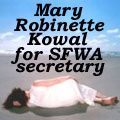 Mary Robinette Kowal is running for Science Fiction and Fantasy Writers of America Secretary!
Mary Robinette Kowal is running for Science Fiction and Fantasy Writers of America Secretary!  By any measure of the times were living in, there is a new audio renaissance. More audiobooks are getting made now than ever before. And more SF, Fantasy and Horror audiobooks are being released than ever before. Here’s a list of the top 10 SFF novels from
By any measure of the times were living in, there is a new audio renaissance. More audiobooks are getting made now than ever before. And more SF, Fantasy and Horror audiobooks are being released than ever before. Here’s a list of the top 10 SFF novels from 




